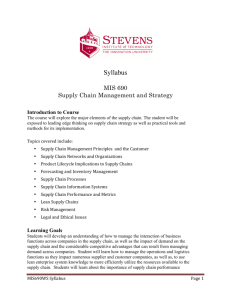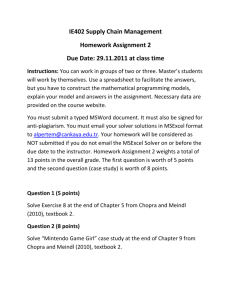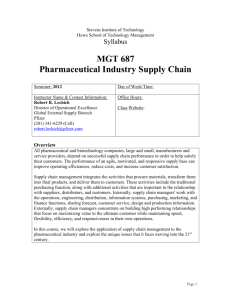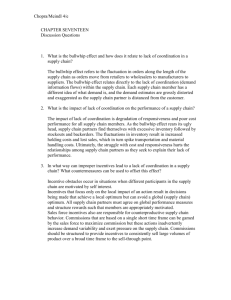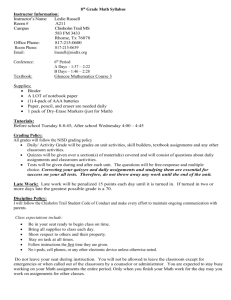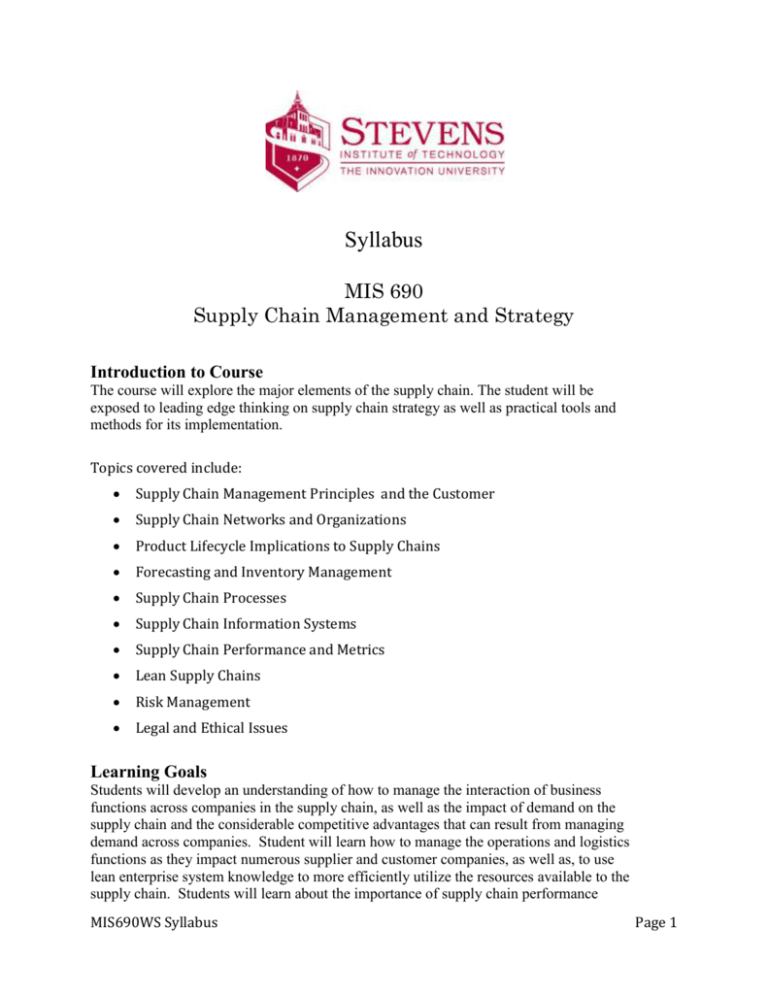
Syllabus
MIS 690
Supply Chain Management and Strategy
Introduction to Course
The course will explore the major elements of the supply chain. The student will be
exposed to leading edge thinking on supply chain strategy as well as practical tools and
methods for its implementation.
Topics covered include:
Supply Chain Management Principles and the Customer
Supply Chain Networks and Organizations
Product Lifecycle Implications to Supply Chains
Forecasting and Inventory Management
Supply Chain Processes
Supply Chain Information Systems
Supply Chain Performance and Metrics
Lean Supply Chains
Risk Management
Legal and Ethical Issues
Learning Goals
Students will develop an understanding of how to manage the interaction of business
functions across companies in the supply chain, as well as the impact of demand on the
supply chain and the considerable competitive advantages that can result from managing
demand across companies. Student will learn how to manage the operations and logistics
functions as they impact numerous supplier and customer companies, as well as, to use
lean enterprise system knowledge to more efficiently utilize the resources available to the
supply chain. Students will learn about the importance of supply chain performance
MIS690WS Syllabus
Page 1
measurement and management, and how to use contemporary information tools to
support decision making in an integrated supply chain environment.
These objectives are carried out at a course level by a solid review of the theory base
associated with supply chain management, along with a discussion of advanced topics,
trends and directions. At a class level course topics are reviewed through a combination
of lecture, discussion, and student project work. Finally, each topic in the course is
addressed through a combination of assignments, case studies, exercises, and readings.
After taking the Supply Chain Management and Strategy course, the student will be able
to :
Understand how supply chain strategy can provide a competitive advantage for
organizations
Recognize supply chain approaches to support products in different phases of
their lifecycle
Analyze the balance between customer satisfaction level and inventory
management policies
Integrate the role of manufacturing capabilities in pursuit of supply chain
objectives
Leverage supplier and distributor capabilities within value generating business
processes
Design lean supply chains with the appropriate levels of risk
Apply information systems to support collaboration and visibility of supply
chains
Pedagogy
This course combines lecture, in class exercises and case studies. There will also be
individual written assignments, team assignments and formal presentations by the
students. Students are expected to use business terminology to credibly present their work
to a knowledgeable business audience. Students are encouraged to understand both
business and technology issues from the perspective of senior business/technology
managers.
Required Readings: Text
Chopra, Sunil, P. Meindl, Supply Chain Management, Fifth Edition, Pearson Prentice
Hall, Upper Saddle River, NJ, 2010, ISBN: 978-0-13-274395-2.
Required Readings: Case Study Studies
CASE No.
TOPICS
READINGS
1
Customer
Perspectives
Product Lifecycle
Slone, Reuben, Leading a Supply Chain Turnaround,
Harvard Business Review, October, 2004
Fisher, Marshall, What is the Right Supply Chain for
2
MIS690WS Syllabus
Page 2
3
4
Supply Chain
Strategy
Supply Chain
Strategy
5
Supply Chain
Information
Systems
6
Risk Management
Your Product, Harvard Business School, March-April
1997,
Lee, Hau L., The Triple-A Supply Chain, Harvard
Business Review, October 2004,
Narayanan, V.G., A. Raman, Aligning Incentives in
Supply Chains, Harvard Business Review, November
2004,
Humphreys, P.K., M.K. Lai, D. Sculli, An interorganizational information system for supply chain
management, Int. J. Production Economics, 70, 2001,
pp. 245-255.
Sheffi, Yossi, J. B. Rice, Jr., A Supply Chain View of the
Resilient Enterprise, Sloan Management Review Fall
2005, pp. 41-48
Exercises and Simulations
Class Team Exercise:
Beer Game
Description: The beer game is an exercise to allow students to experience how supply
chains react to information and decision making. The game will be executed using a webbased application. Students will participate in different roles of the team and work towards
maintaining their supply of "beer" to the customer. The professor will provide details on
the game later in the semester.
Assignments
All assignments are due as noted. If the student cannot attend the class for business
or personal reasons, they are still responsible for handing in their assignment via
email or other agreed upon means with the professor. In fairness to others, grades
for late work will be penalized 10%.
Case Study Critiques
The course will use six case studies to help students gain a more in-depth
appreciation for relevant topics, and students are expected to read and provide a
one page written critique of each case study including the following:
Critique the Author(s) Conclusions or Propositions (Agree or Disagree)
Highlight the Key Lessons Learned
Suggestions on How to Improve the Author(s) Point
If possible, suggest alternative rationale in the case study
If possible, broaden or expand their key points with other examples,
personal or work related.
Students are also expected to discuss the case study in class regarding their insights
gained from the case study. The critiques will be due as per the class schedule.
Class Exercise
MIS690WS Syllabus
Page 3
The course will also use a class exercise to demonstrate first hand the issues of
supply chain. The students will be grouped into teams to execute the exercise and
will be expected to present findings to the class.
Final Presentation and Paper
Each student is expected to do a report consisting of a written paper (15-20 pages) and an
oral presentation (10-15 minutes). The research paper should be typed in a 12 point font,
one inch margins, and a minimum of 1½ line spacing. The structure of the paper should
include the following:
Abstract
Table of Contents
Introduction
Analysis and Critique
Summary
Bibliography
The context of the report should be a topic specific to the area of Supply Chain
Management. Topics can include but are not limited to technical trends in supply chain
information systems, current issues in supply chain management such as global
outsourcing or specific company projects involving supply chain management. It is
encouraged that student’s use a particular topic relevant to their work, if possible, to
utilize the course concepts in a more meaningful way. Topics and abstracts must be
approved by the instructor.
The paper may include several trade and industry references but it must also include a set
of references from academic sources to demonstrate a level of research into current
thinking on supply chain management and issues. It is also recommended to follow
American Psychological Association Publication Association ( http://www.apa.org ) and
Modern Language Association guidelines (http://www.mla.org or Gibaldi, MLA Style
Manual, ISBN 0873526996 )
In the final class of the course, each student shall make a presentation of their final paper.
The oral report should consist of a PowerPoint presentation of your work (providing
enough detail about your work to make it coherent) in class. The emphasis should be on
sharing your insights regarding what you have learned and its application to real world
problems. Students should provide copies of the slides for other class members and the
professor. The final paper should be submitted to the professor by the final class.
Grading
Assignment
Exercises and Case Study Critiques
MIS690WS Syllabus
Grade Percent
30%
Page 4
Mid-Term Exam
In Class Participation
Final Presentation and Paper
Total Grade
30%
10%
30%
100%
Ethical Conduct
The following statement is printed in the Stevens Graduate Catalog and applies to all
students taking Stevens courses, on and off campus.
“Cheating during in-class tests or take-home examinations or homework is, of course,
illegal and immoral. A Graduate Academic Evaluation Board exists to investigate
academic improprieties, conduct hearings, and determine any necessary actions. The
term ‘academic impropriety’ is meant to include, but is not limited to, cheating on
homework, during in-class or take home examinations and plagiarism.
Consequences of academic impropriety are severe, ranging from receiving an “F” in a
course, to a warning from the Dean of the Graduate School, which becomes a part of the
permanent student record, to expulsion.
Reference:
The Graduate Student Handbook, Academic Year 2003-2004 Stevens
Institute of Technology, page 10.
Consistent with the above statements, all homework exercises, tests and exams that are
designated as individual assignments MUST contain the following signed statement
before they can be accepted for grading.
____________________________________________________________________
I pledge on my honor that I have not given or received any unauthorized assistance on
this assignment/examination. I further pledge that I have not copied any material from a
book, article, the Internet or any other source except where I have expressly cited the
source.
Signature ________________
Date: _____________
Please note that assignments in this class may be submitted to www.turnitin.com, a webbased anti-plagiarism system, for an evaluation of their originality.
MIS690WS Syllabus
Page 5
Course Schedule
Session Topic
1
Introduction to Supply
Chain Management
Principles and Strategies
Customer Perspectives
2
Design of Supply
Networks
Supply Chain
Organizations
Product Lifecycles
3
Case Study Review
4
Material Discussed
Review Syllabus
Lecture 1
Chopra and Meindl: Chapters 1,2,3
Lecture 2
Chopra and Meindl: Chapters 4,5,6
Case Studies No. 1 through 2
Supply Chain Forecasting
6
Lecture 3
Chopra and Meindl: Chapters 7,8,9
Lecture 4
Supply Chain Processes:
Procurement and Sourcing Chopra and Meindl: Chapter 13
Management
Class Exercise: Beer Game
Class Exercise
7
Midterm Exam
Midterm Exam
8
Case Study Review
Case Studies No. 3 through 4
9
Supply Chain Processes:
Transportation and
Distribution Management
Inventory Management
Lecture 5
Chopra and Meindl: Chapter 14
5
10
Lecture 6
Chopra and Meindl: Chapters 11,12,13
Lecture 7
Chopra and Meindl: Chapter 10,17
12
Supply Chain Processes:
Manufacturing
Supply Chain
Coordination and
Information Systems
Case Study Review
13
Final Project
Student Final Presentations
11
MIS690WS Syllabus
Case Studies No. 5 through 6
Page 6

